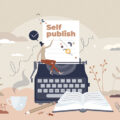How Great Books Inspire Great Writers

CONTENTS
How Great Books Make Great Writers
- Critical thinking
- Ideas, questions, and inspiration
- Perspective
- Self-discovery and personal growth
- Command of language
- Style fine-tuning
The symbiotic relationship between reading and writing is a cornerstone of our individual intellectual journey and our educational system. We write as an act of self-expression. We read because language renders unto us the vitality of real and imagined experience. —Marita Golden
Reading improves our facility with words. And since words are a writer’s means of expression, is it any wonder that reading is a must for writers if they are to become great? Just as chefs must eat to understand food, challenge their palate, and expand their repertoire, so too must writers read great books to write great books.
Let’s explore the reading and writing relationship.
Reading as a Writer
When you read as a writer, you become more immersed in the experience. Because of this, you put yourself in a great position to learn from another writer, which will help you fine-tune your own writing. Reading as a writer allows you to go beyond using regular reading skills such as comprehension and fluency to using your analytical skills to determine how a book was written. As you read, you take note of the choices the author made, the devices being used, how they structured their text, the overall effect of the text, and so on. Reading as a writer is a rewarding experience. It keeps you more engaged, and inspiration and ideas come more easily when you’re engaged.
As you read a book word by word and page by page, you participate in its creation, just as a cellist playing a Bach suite participates, note by note, in the creation, the coming-to-be, the existence, of the music.— Ursula K. Le Guin
Writing as a Reader
Conversely, to be an effective writer, write with your readers in mind, or write your book as you would want to read it. This means you factor your readers into the choices you make—from plot development to character development, from thematic exploration to the extent of research and scope of the book. As you write, and revise, you pay attention to how your text will read, whether your reader will get exactly what you mean, whether they will have enough information and cues to come to their own independent conclusions or form their own opinions as you intend them to. You’ll want to make sure that the book you give your readers matches your intention for writing it., even though you may have modified your intentions somewhere along the writing and revision processes.
I can’t write without a reader. It’s precisely like a kiss—you can’t do it alone.—John Cheever
What Makes a Great Writer?
You may have always had a facility for language, a way with words. Or you may be working on improving your command of language because you have a story to tell, an idea to sell, or an argument to make. This means you have the makings of a book. The only thing left to do is to write that book.
But exactly what kind of book do you want it to be? And what kind of writer do you see yourself as? You may have this vision of being a novelist, or a short story writer, or a poet, or a nonfiction writer delving into a specific subject matter. But just as importantly, you must envision yourself as a great writer.
So what makes a great writer?
Here are several crucial factors that must come together to make you a great writer:
- A natural aptitude for language
This is a basic requirement. Without a natural talent for words, there would be nothing much to work with, nothing much to build on to create a writing life. Just as you must have a keen ear for music to be a musician, so you must also have a natural aptitude for language to be a great writer.
- Having a writer’s mind-set
You must think of possibilities, keep asking What if?, and be aware of the most common obstacles that writers have to deal with, from time to time—most notably writer’s block and that nasty imposter’s syndrome (the belief that you may not really have what it takes to be a writer, let alone a published author). You must also take stock of your own set of limitations—which you must either strive to overcome or work within. To have a writer’s mind-set involves awareness of the world, thirst for learning, curiosity, mental fortitude, self-motivation, and flexibility in your way of thinking.
- Professionalism
When you’re not working a nine-to-five job (unless you really want to schedule your writing from nine to five, five or six days a week), it can get easy to get distracted, put off work, or simply get lazy. And although deadlines may prove counterproductive, being a professional involves effective management, establishing a realistic schedule and sticking to it. It means cultivating healthy work habits and routines, as well as taking time off to give yourself time to recharge your batteries, reorient yourself with your writing, get inspiration from unexpected places, and so on.
- Having the right tools for the job
To be productive, you have to choose tools that allow you work without a fuss. An unwieldy old laptop with some keys misbehaving will only frustrate you, and a word processing program that you’re not comfortable with will slow you down, and maybe cause you to lose files or fail to save your work.
- Having a suitable working space
Unlike journalists who can write in the middle of chaos, on the go, or practically anywhere, you will have to be more particular when it comes to your writing space. Ideally, it should be a room that’s tucked away from foot traffic in a quiet part of the house where there’s plenty of natural light.
When I look back, I am so impressed again with the life-giving power of literature. If I were a young person today, trying to gain a sense of myself in the world, I would do that again by reading, just as I did when I was young.—Maya Angelou
How Great Books Make Great Writers
You know what else makes a great writer? Great books. Reading.
Here are the reasons why:
- Critical thinking
Reading is great for developing your critical thinking skills. And the more you are exposed to great works, the more discerning and appropriately discriminating you become in your choices of what to read. You become adept at spotting what’s working and what isn’t (if any).
Learning how to be a good reader is what makes you a writer.—Zadie Smith
- Ideas, questions, and inspiration
Great books often serve as a catalyst for another writer’s creative work. They offer great ideas, which you can use as starting points for your own writing. How many author interviews have you read where the author talks about how a certain book inspired his work?
Great books also ask important questions—from clever, to insightful, to disturbing. Because to be a writer, you have to open your eyes to the world and see what is, learn about what was, imagine what could be, and warn about what shouldn’t be. Some authors answer the important questions that they pose. Others simply ask the questions, because at the time of writing, they don’t have the answers yet—but they understand that the questions have to be put out there.
Reading is an active, imaginative act; it takes work.—Khaled Hosseini
- Perspective
Great books can change the way you see things and the way you feel about things, places, people, and yourself. And having your perspectives realigned can be a such watershed moment in your life that translates into what you write. Reading great books guarantees perspectives that are worth exploring, especially if they are unfamiliar or wildly radical. That’s how you broaden your horizons.
Reading is an exercise in empathy; an exercise in walking in someone else’s shoes for a while.—Malorie Blackman
- Self-discovery and personal growth
A great book can unlock something inside you that you didn’t even realize is integral to who you are and where you can go and what you can become yet. Something that you must express through your own words. It can offer catharsis, emotional, mental, psychological, or all three. The resulting self-knowledge and self-understanding/acceptance makes you a confident writer, who is sure about what you want to say, who you want to say it to, and how to say it. Just as great books help you know yourself and grow as a person and as a professional, so your books in turn will do the same to your readers.
Books are mirrors: You only see in them what you already have inside you.—Carlos Ruiz Zafón
- Command of language
Great books improve your vocabulary, hone your grammatical accuracy and fine-tune your senses to the nuances and varying rhythms of the written word.
A comprehensive vocabulary and pinpoint grammatical accuracy (as well as knowing when and how to break the rules) are a must for outstanding writing. You have to be able to express exactly what you want to say, write accurate and vivid descriptions (a must in worldbuilding), and get creative with words in a way that your readers will enjoy—among other things.
Having a good sense for the written word, beyond vocabulary and grammar, allows you to create structures and imageries, as well as establish rhythms that amplify your message/themes, lends an unmistakable atmosphere to your stories, infuses a certain attitude to your expositions, and so on.
Reading is essential for those who seek to rise about the ordinary.—Jim Rohn
- Style fine-tuning
As you read more and more, you develop a sharper sense of various writing styles. You consciously and unconsciously adopt and discard as you go, fine-tuning the elements that you choose to keep to create your own style. Overtime, reading and constant practice will make you less self-conscious, and you’ll be able to make stylistic choices that seamlessly work with your subject matter.
Every style is excellent if it is proper; and that style is most proper which can best convey the intentions of the author to his reader. And, after all, it is Style alone by which posterity will judge of a great work, for an author can have nothing truly his own but his style; facts, scientific discoveries, and every kind of information, may be seized by all, but an author’s diction cannot be taken from him.—Isaac D’Israeli
The Takeaway
If you’re looking for literary inspiration, read. Books are the best tools for honing your writer’s craft. They offer a wealth of ideas, enriching companionship, rewarding challenges, emotional, mental, and/or psychological catharsis, or just pure entertainment—and always, pointers for technical improvement.
Interesting Facts
Pleasure readers have a high level self-esteem and a great ability to cope with challenging situations.
Kids who read at least 20 minutes every day will be exposed to approximately 2 million words annually.
Reading fictional books are shown to increase better decision-making in people by 50% to 100%.
Reading comedic fiction increases your empathy toward others.
Writing and reading decrease our sense of isolation. They deepen and widen and expand our sense of life: They feed the soul. When writers make us shake our heads with the exactness of their prose and their truths, and even make us laugh about ourselves or life, our buoyancy is restored. We are given a shot at dancing with, or at least clapping along with, the absurdity of life, instead of being squashed by it over and over again. It’s like singing on a boat during a terrible storm at sea. You can’t stop the raging storm, but singing can change the hearts and spirits of the people who are together on that ship.—Anne Lamott, Bird by Bird
Recommended Posts
GETTING PUBLISHED
WRITING
PUBLISHING
MARKETING






